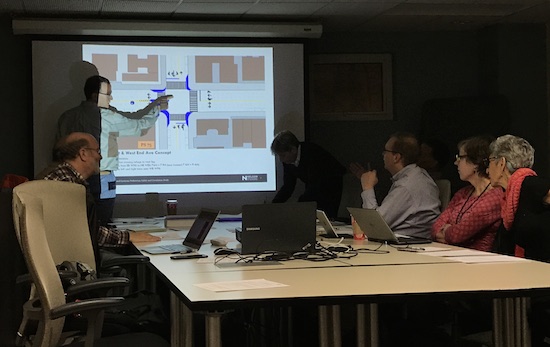
The Community Board discusses the intersection of 96th Street and West End Avenue.
By Howard Freeman
The debate over whether to remove parking spaces for safety projects continued to rage on Tuesday at a Community Board 7 Transportation Committee meeting. That was among the most heated of the 10 items discussed at the two and a half hour meeting.
The ten agenda items covered parking, Citibike, dangerous driving on 106th Street, and updates on the proposed MTA fare hikes this spring.
CB7 discussed the following issues:
- An approval of the Greenmarket/GrowNYC permit for West 97th Street (Columbus/Amsterdam).
- Discussion of a mid-block crossing at 106th (Columbus/Amsterdam) to allow seniors to cross between the Red Oak residence and Jewish Home Lifecare.
- The conundrum of West 71st (Amsterdam/WEA) and why this thoroughfare—oft used by those getting on to the highway—has no daytime parking.
- The Park Royale’s request (W73rd) for a “No Parking Anytime” sign and a heated debate whether or not the committee actually had a standing “policy” of declining all requests.
- A report by a firm called Nelson-Nygaard that includes recommendations for the high-volume intersection at 96th and WEA. There are multiple recommendations still being studied, including having a split phase light, a “pedestrian refuge” mid-street, bump-outs, and more. No one raised the issue of whether or not cars coming in and out of the mechanic shop/gas station just west of WEA exacerbated the problems.
- The plan to change the direction of some streets in the West 60s is on hold until spring, when roads can be marked.
- More loading zones are needed. There was a fair amount of acerbity on why national brands seemed to get a deal by the DOT on double parking or loading zones when local stores did not. DOT rep Colleen Chattergoon, who seemed otherwise to have the trust of the committee for her hard work and subject matter expertise on all items discussed, denied this particular claim. A minority of committee members felt that the congestion caused by deliveries was not a safety issue.
- Co-chair Andrew Albert reported that MTA meetings on fare hikes are this week and next, which he is attending. Fares, to change in February or March 2017, would either stay at $2.75 but reduce the bonus, or go to $3.00 and increase the bonus, with no service reductions but rather service enhancements (undisclosed). Albert further raised the idea of a “Freedom Ticket” to allow NYC residents who use the LIRR to get a lower fare and commute more quickly.
- Near the close of the meeting, a woman in the audience complained that she could no longer find parking because Citi Bike was taking up too many spaces. One committee member said ““I have one word for you: Uber.”
- “We have continued to refuse prioritizing safety over parking spaces,” said one CB7 member.



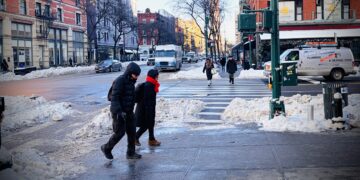


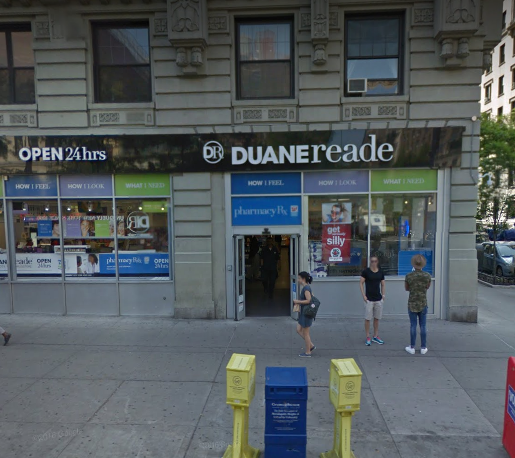
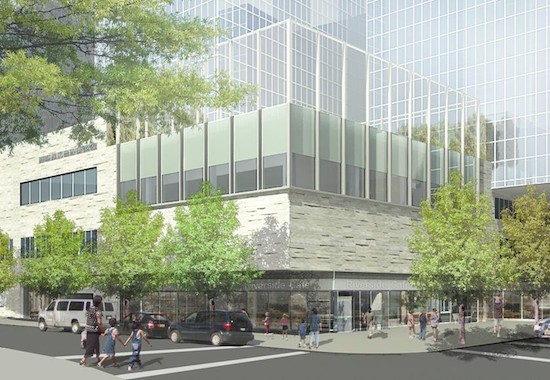
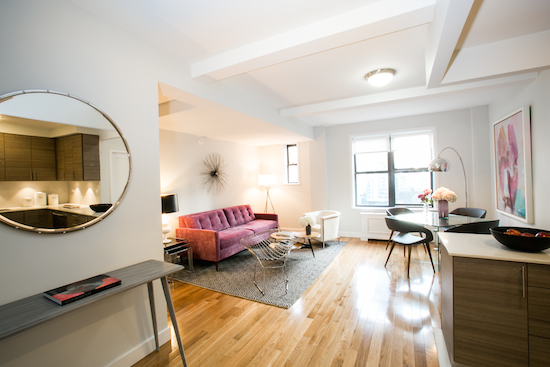
So I guess cb7 is advocating for MORE car traffic by saying…”I have one word for you-Uber.” Really.
Uber is actually way more efficient. Personal cars spend 90%+ of their life sitting parked empty or looking for parking, where Ubers spends 80%+ of their time actively transporting passengers. Since a large percentage of the traffic on the UWS is people looking for parking, if everyone driving personal cars used UBER instead, traffic would go way down.
I understand — and actually appreciate — the snark, but in the context of the meeting, the speaker meant to de-fuse the complainant’s indignation by drawing attention to the larger issue of a scaled response to bikes v. parking spaces.
What the speaker should have said was “take mass transit”
Co-chair Andrew Albert did say that at one point. The complainant claimed that her mobility was limited by her disability and that she needed a car nearby. Others suggested Via for a cheaper ride share.
Confused about the W71st item – vehicles are constantly parked on both sides of that block. The bigger issue imo is that turning vehicles (southbound on Broadway and northbound on Amsterdam) can’t turn because of high pedestrian traffic and end up blocking the box. As a pedestrian, I hate the fenced corners and midblock crossings in midtown, but as a driver I hate ending up blocking the box because I won’t play chicken with pedestrians (who are jaywalking in the short time after their walk sign turns off and before the traffic light turns green for the cross street). I am surprised there are not more injuries at that corner, particularly after dark.
Only commercial vehicles are allowed to park on W71st btw Amst and West End during the week, and only on the north side(I believe). Basically that part of W71st becomes a three lane road. It is also goes downhill and often cars and trucks speed down it to make a left or right onto West End. it is a very dangerous and a number of accidents have occurred there. At one time that block allowed alternate street side parking on which helped to slow the speeders, but the DOT switched it to accommodate commuters over pedestrians.
I’m not familiar with the daytime situation at W71, but a resident petitioner said that there is no normal parking, rather only parking for trucks loading and unloading, particularly McDonald’s.
It may surprise some regular contributors to this chain, but mass transit does NOT go everywhere. There are actually people who live in the neighborhood who can’t work without a car. Chic as it is to denounce car owners as selfish, subway-hating, and anti-social polluters, mass transit is not always (currently) the answer.
It seems to me there are solutions to our local problems worth examining which don’t require inflicting ever-increasing hardships on your neighbors who own cars. Until automobiles are made illegal, they will exist and people will use them when they have to. So let’s accept the fact and fold that into the recipe for neighborhood improvement.
For instance: Why is NYC the only major city in the USA that does not have resident parking permits? There would be MANY fewer cars in our neighborhood if out-of-towners were unable to park on our streets, go to work further downtown, and then subway it back up at the end of the work day to pick up their cars to head home.
Couldn’t agree more. Boston and Chicago have such permits. We’re told it would be mean to people from Jersey and bad for tourism if they’re not allowed to drive in and park free of charge for 2, 3 days at a time. But I, as a NYC resident, can’t do that in Hoboken, where parking is severely rationed in favor of Hoboken taxpayers. Our political “leaders” really have their heads up their backsides. I guess they’re too busy giving municipal IDs to illegal immigrants and tearing down old white male statues to even contemplate this issue.
Resident permits came up at the very end of the meeting, but only briefly and as an afterthought. Watch for it, though, on a future Transportation Cmte agenda.
I was commenting on what the speaker said in terms of Uber., not car ownership. I thought it was ridiculous the speaker would use Uber to make a point. I think people in the city have a right to own a car. ..especially for the reasons you cite. I never understood the argument if u live in the city you can’t have a car.
The law that says you can’t have a car, is the law of supply and demand. If you can’t afford the expense of garaging your car, you can’t own it.
You are not entitled to street parking. It’s a limited commodity in high demand, and being mispriced.
So are you saying only rich people can have cars? Low and middle class folks be damned?
Wait, what? why are you thinking people are opposed to residential parking permits?
108,000 households on the Upper West Side and 75% of us don’t have cars. How many of the 25% with cars NEED them, of course we don’t know. But I’m hugely supportive of residential parking permits and market pricing for street space. Along with safe streets that have cleaner air and are injury-free, and fairly allocate space to maximize quality of life, this is a solid gold suggestion! I hope it gets taken seriously.
Absolutely Margaret! If less then 25% of the people in the neighborhood need tax payer funded on street parking, lets create neighborhood permits and charge market rate for them.
Of course, people who need cars to go beyond mass transit’s reach can leave those cars near the train where they exit.
And the people who Parkin your area and ride to work from there (not sure how that’s done given alternate side) are gone by the time car commuters come back to the neighborhood. They are not the reason you have difficulty finding free parking when you return home from work.
There is only one reason that it’s hard to find free parking. The cost.
Residential parking permits might work in some of the lower density areas of Staten Island, Brooklyn, Queens and the Bronx, but would be difficult here in Manhattan.
Off the bat would be deciding who would be eligible. Would it be like EZ-Pass was initially where you would have to own a vehicle?
What about the not so small numbers of persons employed by buildings and or work/own businesses on a street/in area?
Would the permits be restricted to a specific street or area? If so how to decide the boundaries.
Finally how to parcel out the limited number of spots available on any given street or avenue. Just one or two high rise buildings could contain enough persons with vehicles that want permits to take up the entire lot.
Take CPW from Columbus Circle to 96th; that is one long piece of real estate lined with high rise buildings
The way that cities everywhere around the world do this is to designate zones. Community districts, like CB7, would be the obvious choice here. Sometimes the residential permit hours are overnight only, so the small business employees who need to drive and park here during the day could carry on without hassle.
I wouldn’t get hung up on the details, because it works all around the world. You get a residential parking permit for the vehicle you own that’s legally registered to your home address. Yes, by design it weeds out anyone who’s cheating the system through insurance fraud. If you need an overnight visitor permit for occasional visitors who don’t want to take a cab or pay for a garage, cities usually issue one or two visitor permits per household.
Parking permits do not guarantee a space. They limit the number of people competing for the available spaces, thereby raising the odds of a permit holder finding a spot.
“One committee member said ““I have one word for you: Uber.””
This, in itself, is reprehensible. Whatever the personal thoughts of the committee member, they’re there to serve the community, and until New York City forbids car ownership it’s within this committee’s purvey to recognize the ongoing needs of community members.
Had a member of the community had a concern about the availability of houses of worship in the community, would it have been acceptable for this same individual to say “I have one word for you: Judaism?”
Different liberties, same impropriety.
That would be an exciting community board meeting, given there are a few general Constitutional restrictions on government and the establishment of religion. Not a straight analogy to free parking vs, say, parking meters or zipcars or shared bicycles.
I think pedestrian safety is compromised at least as much by bicycles, skateboards, scooters, motorized bikes, etc. as by automobiles. As far as European models go, anyone who has traveled there knows that pedestrians follow the law when crossing streets, as do bikes. Part of what we love about NYC is that it is a pedestrian city, but a lot of the pleasure is gone–taken away by the anxiety to having to look in all directions at all time, and being ever-vigilant about bicycles racing through red lights, weaving in an out between moving lanes of traffic, going the wrong way, and on and on.